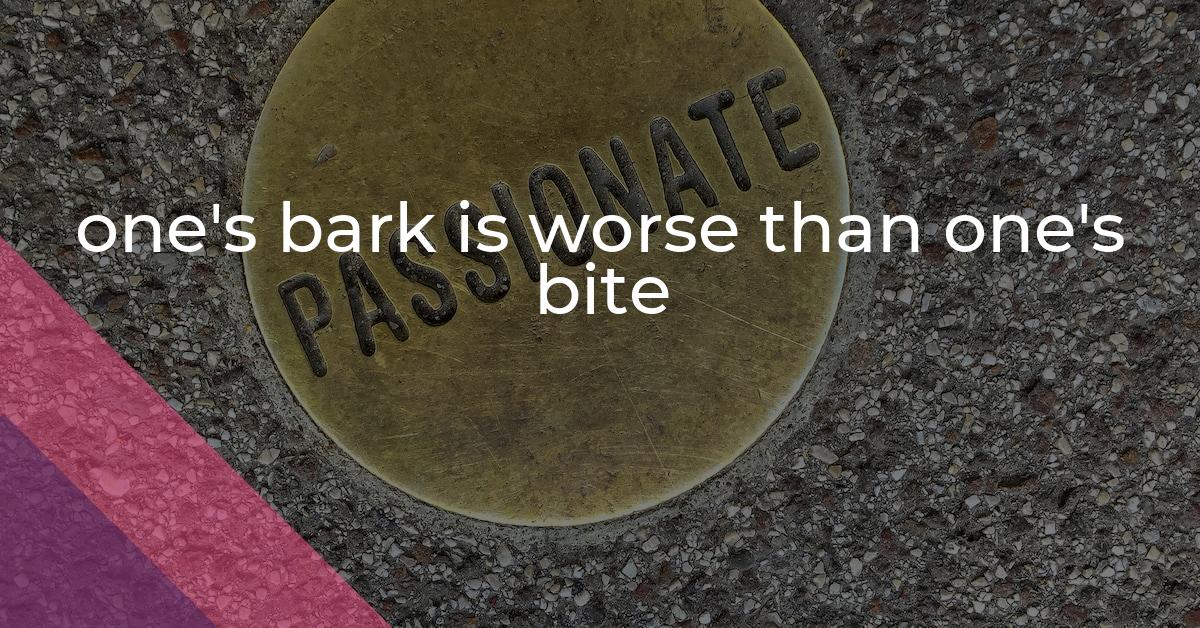one’s bark is worse than one’s bite: Idiom Meaning and Origin
What does ‘one's bark is worse than one's bite’ mean?
The idiom "one's bark is worse than one's bite" means that someone may sound or appear threatening, but they are not actually as dangerous or harmful as they seem.

Idiom Explorer
The idiom "wolf in sheep's clothing" refers to someone who appears to be harmless or gentle, but is actually dangerous or malicious.
The idiom "salt in the wound" means to worsen an already difficult or painful situation, often by adding insult to injury.
An idiom that refers to the spreading of false information or gossip about someone or something, often with the intention of damaging their reputation.
An idiom often used to describe a person who is disliked or considered bad, with negative qualities or behavior.
The idiom "ring hollow" means that something sounds insincere or not genuine, lacking in substance or meaning.
The idiom "reap what one sows" means that a person will face the consequences of their actions, whether positive or negative.
The idiom "raise one's voice" means to speak louder or shout in order to be heard or make one's point more emphatically.
Meaning: To say or do something embarrassing, foolish or inappropriate inadvertently.
The idiom "punch below one's weight" means to perform or compete at a level that is below one's true abilities or potential.
Sweet but Savage
The idiom "one's bark is worse than one's bite" is an expression used to describe someone who may seem aggressive or threatening, but is actually not as dangerous or powerful as they appear. This phrase suggests that a person's actions or words may give off the impression of being fierce, but their actual capabilities or intentions are less formidable.
The origin of this idiom can be traced back to the analogy of an animal, specifically a dog. When a dog barks loudly and aggressively, it may create the perception that it is a dangerous or fierce animal. However, upon closer inspection, it becomes apparent that its bite is not as powerful or threatening as its bark. This phrase transfers the characteristics of a dog to human behavior.
Don't let his bark fool you, he won't bite.
It is important to note that "one's bark is worse than one's bite" can be used in different contexts and situations. It can refer to individuals who use intimidating language or behavior to assert dominance or control, but are ultimately unable to back up their words with action. Additionally, it can be used to describe situations or events that initially seem more serious or dangerous than they actually are.
This idiom can be applied to the idiom "all bark and no bite". This idiom is used to describe someone who talks tough or makes empty threats, but does not follow through with action. It is similar to "one's bark is worse than one's bite" in that it highlights the disparity between someone's intimidating appearance or behavior and their actual capabilities or intentions.
Furthermore, the idiom "one's bark is worse than one's bite" can also be related to the saying "wolf in sheep's clothing". This saying refers to someone who appears harmless or trustworthy, but is actually malicious or deceitful. It warns against judging solely based on outward appearances, as someone may not be as they seem.
The use of this idiom is not limited to a specific region or culture, and it has become a part of everyday language in many English-speaking countries. It is commonly used in informal conversations, written texts, and even in the media. The versatility of the idiom allows for its application in various scenarios, such as politics, sports, relationships, or any situation where someone's intimidating appearance or behavior is not substantiated.
"one's bark is worse than one's bite" is a metaphorical expression that suggests a person or situation may appear more dangerous or threatening than they actually are. This idiom draws from the analogy of a dog's behavior, where its loud and aggressive barking does not necessarily indicate its actual bite. It is frequently used to describe individuals or situations that lack the capabilities or intentions to follow through on their intimidating appearance or words. The idiom is widely recognized and used in the English language, crossing regional and cultural boundaries. By understanding the meaning and origin of "one's bark is worse than one's bite," one can better navigate and interpret the intentions and capabilities of others.
Example usage
Examples:
- Even though he talks tough, his bark is worse than his bite.
- She may seem intimidating, but trust me, her bark is worse than her bite.
- Don't be scared of him, his bark is definitely worse than his bite.
The idiom "*one's bark is worse than one's bite*" is used to describe someone who appears to be more aggressive or threatening than they actually are. The phrase emphasizes the fact that their words or actions might seem intimidating, but they are unlikely to follow through with any real harm or aggression. It implies that they are more bluster than actual substance, and that their actions do not match the severity of their threats.
More "Intimidation" idioms



